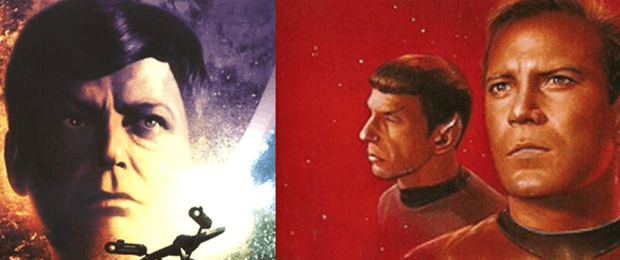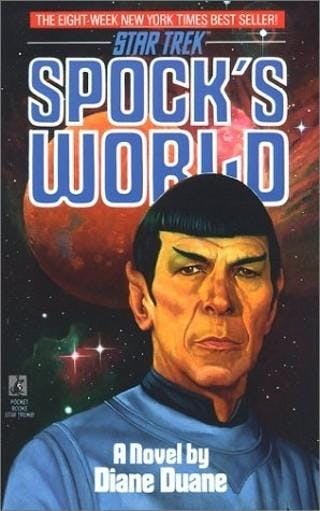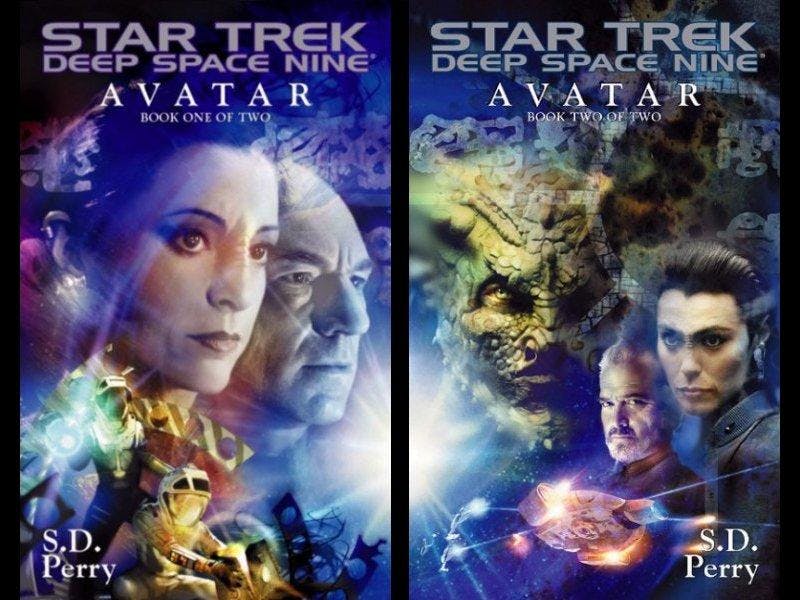Published Sep 16, 2013
Ten For Ward: Ten Star Trek Novels for the New Star Trek Novel Reader
Ten For Ward: Ten Star Trek Novels for the New Star Trek Novel Reader

It’s happened to most of us at one time or another: You and your friends are sitting around, watching Star Trek and maybe discussing this or that character, or perhaps you’re comparing the story to other episodes, or how you wish this or that plot thread could be revisited, and then you or someone else in the group says something along the lines of, “Hey, that shows up later in one of the books.”
There’s always at least one friend who says something like, “What book?”
“That Star Trek book (:: insert name of Star Trek book here ::).”
“Oh, well I don’t read the books.”
WHAT?
Yes, the simple, uncomfortable truth is that such people do seem to exist. Hey, it’s a mystery to me, too.
What to do when faced with a friend who’s a Star Trek fan, but for whatever reason hasn’t checked out the vast array of Star Trek novels? Or, maybe said friend had a “bad experience” with one or two books back in the day, and they haven’t been back since. How might one go about enticing such a fan to give the books a first or second chance? It sounds like we need a list of good “introductory” Star Trek novels, don’t we?
Of course, such a list is bound to vary from reader to reader, particularly when there are so very many novels from which to choose. My selection of possible “primer books” certainly wouldn’t be a definitive list, and so with that in mind I took to my blog and enlisted the assistance of my readers, asking them to submit for consideration a single Star Trek novel and their reasoning as to why a particular title carries with it the ability to serve as an “ambassador to Star Trek fiction.”
So, with a little extra help of my own to round out the list of ten suggestions, here’s what my posse came up with. Offered here in order of their original publication:

Spock’s World, by Diane Duane – September 1988 (suggested by Dan Gunther) – This, Pocket Books’ first hardcover Star Trek novel, offers an examination of Vulcan’s history as the world and its people are gripped by unprecedented crisis. According to Dan, this story is “the epitome of what makes a Star Trek novel great.” Duane, whose various Star Trek novels are among many fans’ list of favorites, has a definite knack for capturing the voices of the familiar characters, and she’s also able to paint for the reader a vivid mental picture of the world(s) the characters inhabit. As Dan says, “Reading this novel, I felt that I “knew” Vulcan and its inhabitants in a way I never did while watching the shows or films.”
Prime Directive, by Judith & Garfield Reeves-Stevens – September 1990 (suggested by Allyn Gibson) – The Federation’s most famous starship and its crew are cast away in disgrace after their apparent disregard for the Prime Directive results in the destruction of an entire civilization. Allyn makes the case for this novel by describing three things it brings to the table in the finest Star Trek tradition: Strange new worlds, philosophical dilemmas, and characters. “Star Trek does best when we see cool things and new places,” Allyn reminds us. At the story’s center is perhaps one of the most in-depth discussions and dissections of Starfleet’s most cherished law: “How far does the Prime Directive extend? Is the Prime Directive viable? Does the Prime Directive essentially mandate extinction and genocide?” Finally, few writers can match the Reeves-Stevens for capturing the essence of the original series characters. “There’s a real sense in the book that Kirk’s crew is a family, and the book pushes the characters to their limits and shows that, even at their worst, they’re still who they are.”
Imzadi, by Peter David – August 1992 (suggested by David Mack) – The heretofore unseen romance between Commander Will Riker and Counselor Deanna Troi is the focus of this time-spanning story, offering insight into how their past relationship affects their careers aboard the Enterprise-D as well as their future selves. As David explains, “It has a terrific story that blends time-travel, adventure, romance, and humor. It explores the Riker/Troi relationship with wonderful depth and sensitivity.” Bound by the parameters established for Star Trek novel writers of the day, which prohibited any real long-term change or growth with the major characters, Peter David still is able to craft a compelling, even heart-wrenching tale that succeeds within this framework. Mr. Mack seems to think so, as according to him, “its ending is also one of the best I’ve ever read in a Star Trek novel.”

Federation, by Judith & Garfield Reeves-Stevens – November 1994 – Released just as Star Trek Generationswas getting set to hit movie screens, this is the other crossover between Kirk and Picard, though it happens in much less direct fashion here. Parallel storylines involving both captains and their respective Starship Enterprise unfold alongside a third narrative focusing on Zefram Cochrane, the inventor of warp drive, and showing us how his life in the 21st Century was affected following his great discovery. Cochrane’s backstory would be defined “for real” a couple of years later with the release of Star Trek: First Contact, but that film’s different take on the character doesn’t diminish this story, which remains a fan favorite.
Mosaic, by Jeri Taylor – October 1996 – Written by one of the creators of Star Trek: Voyager, this novel is as close to an official “autobiography” of Captain Kathryn Janeway as we’re liable ever to get. The novel chronicles Janeway’s life story from early childhood through her Starfleet career, including the personal and professional triumphs and tragedies which all served to forge Janeway into the capable starship captain she eventually would become. Some plot points from the book later were referenced in Voyager episodes, in particular the events surround the death of Janeway’s father. Jeri Taylor later would write a companion to this novel, Pathways, which offers similar insight into the rest of the main Voyager characters.
Articles of the Federation, by Keith R.A. DeCandido – June 2005 (suggested by “8of5”) – A very atypical Star Trek novel, this story gives us a detailed look into the administration of Federation President Nanietta Bacco, who would become a pivotal character in the expanding, interconnected continuity of the 24th century Star Trek novels to come. As 8of5 reminds us, “With interstellar politics playing a much greater role in the later books, it would be a great way to introduce a new reader to that side of Star Trek, something that has been developed far more on the page than it ever was on-screen. And it would also serve to highlight what a varied world of fiction Trek-lit is.” What he said.

Harbinger, by David Mack – August 2005 (suggested by Brian Cross) – The first novel in the fan-favorite Star Trek: Vanguard “literary spin-off series” definitely has a lot going for it. Brian seems to think so: “In essence, this book is like the pilot episode of a new Trek show; lots of new characters and great themes to kick things off, so a new reader won’t get lost.” Mr. Cross also seems to think a book like this is an ideal “entry point” for Trekkies looking to sample the books. “For longtime Trek TV fans who haven’t read any novels, there’s lots of references to episodes and other plotlines; however, they’re not so blatant that a newcomer to the franchise would be confused.” I have to admit to more than a bit of personal bias toward this suggestion, thanks to my involvement in the Vanguard series, but I’m hoping no one here will hold that against me.
The Crucible Trilogy, by David R. George III – September and December 2006, March 2007 – This epic trio of stories was written as part of Pocket Books’ celebration of Star Trek’s 40th anniversary. They use as their springboard the landmark episode “The City on the Edge of Forever” in order to provide us with an in-depth examination of how very differently Kirk, Spock, and McCoy were affected throughout the rest of their lives by the events of the episode. Crucible is notable in that it stands apart from most of the other Star Trek novel offerings, remaining consistent with the television episodes and films while not worrying about shared continuity with any of the other books. It’s an ideal way to introduce a new reader to Star Trek fiction without having to worry (at least at first) about recommending other related books.
The Destiny Trilogy, by David Mack – September-November 2008 – Prospective new readers looking to find out what happened to Captain Picard and the crew of his Enterprise, along with the characters from Star Trek: Deep Space Nine, following the events of Star Trek: Nemesis have an excellent jumping-on point with these three books. The Borg launches a massive, devastating assault on the Federation, providing Mack with an opportunity to reveal the origins of the enigmatic, relentless race and their ongoing campaign to conquer the galaxy. Worlds are destroyed, entire civilizations are lost, and Starfleet and the Federation find themselves on the brink of annihilation. The events of these novels effectively reshuffled the Star Trek fiction game board so far as the 24th Century was concerned, with plot threads and aftereffects which continue to resonate through subsequent novels.

Full Circle, by Kirsten Beyer – April 2009 (suggested by Jeremy Woolward) – When Star Trek: Voyager ended in 2001, Pocket Books attempted to “relaunch” the Voyager novel line in order to push the story of the ship and its characters beyond the finale of the TV series, much as it had done to great success with Star Trek: Deep Space Nine. Full Circle, in essence, is a relaunch of that relaunch, serving the dual purpose of beginning a new chapter in the Voyager saga while at the same time attempting to connect the series to the larger tapestry of 24th century storytelling already taking place in the Next Generation, DS9, and Star Trek: Titan novels. Jeremy seems rather taken with the book, as according to him, “Full Circle does an amazing job at filling in gaps for readers as to what happened post-”Endgame” while re-introducing the Voyager characters to new fans and setting the stage for their new adventures…Full Circle celebrates the best of Voyager while being the perfect place to launch forward, as [it] takes Voyager back to where it began: the Delta Quadrant….”
Honorable Mentions: These also were suggested by readers of The Fog of Ward, and are included here in the interest of…well…because I felt like it:

Enterprise: The First Adventure, by Vonda N. McIntyre – September 1986 (suggested by Jordan Hoffman) – Just what you might infer from the title and published to coincide with the original series’ 20th anniversary, this novel offers us what at the time was the “previously untold” story of James Kirk’s first mission as captain of the U.S.S. Enterprise. All of the familiar characters are here, despite the potential continuity hiccup this seems to present with respect to the TV show’s pilot story, “Where No Man Has Gone Before,” and fan opinions were all over the place regarding Kirk’s inaugural mission, which most definitely was not what a casual reader might expect when sitting down to read this book. Still, as Mr. Hoffman points out, “This is a fun one, and a good place to start for obvious reasons.” He also observes that time and distance now afford fans an opportunity we didn’t have in 1986, as the novel, “makes a great game to compare to the [2009] film.”
Q-Squared, by Peter David – July 1994 (suggested by Gene Russell) – As Peter David himself once said when describing this novel, “Q-Squared is almost my challenge to the reader to keep up with me.” It’s arguably one of the most ambitious novel storylines ever attempted, with the omnipotent being known as “Q” coming to Captain Picard for help when it seems that a member of the Q Continuum has “gone rogue,” having acquired unmatched power that even the Continuum fears. The rebel Q is none other than Trelane, “The Squire of Gothos,” first encountered a century earlier by Captain Kirk, and now he’s on a rampage, threatening the existence of everything, everywhere. Multiple timelines and realities unfold in parallel, and Peter juggles them all with ease.
Once Burned, by Peter David – October 1998 (suggested by David Gian-Cursio) – Pocket Books took a chance in 1997 when it introduced Star Trek: New Frontier, the first ever attempt at an ongoing series of Star Trek novels featuring a ship and cast of characters which were not based on one of the television series. Without many of the contraints inherent in using one of the “canon” crews, author Peter David was free to take this new series into all sorts of situations which likely never would happen on television. After 22 novels and a handful of short stories, New Frontier remains popular with Star Trek novel readers, and Once Burned offers a detailed examination into the life of the series’ central character, Captain Mackenzie Calhoun, prior to his taking command of the U.S.S. Excalibur.
Avatar, Books 1 and 2, by S.D. Perry – May 2001 (suggested by “8of5”) – This duology picks up after the pivotal events of the Star Trek: Deep Space Nine series finale. With several of the characters having departed the station (or missing in action…?), the books bring into the fold new faces to replace them. Chief among the new arrivals is Ro Laren, who takes over as the head of the station’s security under the command of Colonel Kira Nerys. These two novels essentially set the stage for much of the ongoing 24th century storylines in Pocket Books’ current run of Star Trek novels.

Taking Wing, by Michael A. Martin & Andy Mangels – April 2005 (suggested by Jim Cushman) – Here we have another “premiere book” launching its own series of novels, this time “starring” Captain Will Riker and the crew of the U.S.S. Titan following the events of Star Trek: Nemesis. A big fan of the series, Jim explains, “There is a lot of action, some great character introductions, and we get to see some political workings with the state of the Romulan Empire. Personally, I think it’s the natural progression to the TNG universe.”
Okay, that’s ten, and then some. We only have so many spots to work with, and I’m already pushing the boundaries of the whole “Ten for Ward” gimmick, so if we didn’t mention a title you think makes for a fine introduction to Star Trek novels for the first-time reader, feel free to offer it and your reasons in the comments. The more, the merrier!
Dayton Ward is the author or co-author of numerous novels and short stories, including a whole bunch of stuff set in the Star Trek universe, and often working with friend and co-writer Kevin Dilmore. He’s also written (or co-written) for Star Trek Communicator, Star Trek Magazine, Syfy.com, and Tor.com, and is a monthly contributor to the Novel Spaces writers blog. As he is still a big ol’ geek at heart, Dayton is known to wax nostalgic about all manner of Star Trek topics over on his own blog, The Fog of Ward: http://daytonward.wordpress.com.“Ten for Ward” Backlist: http://www.startrek.com/news_articles/blogger/Dayton+Ward+
